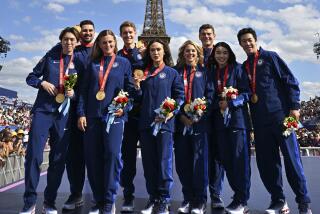London Olympics: U.S. men’s gymnasts leap to the fore
- Share via
LONDON – Danell Leyva, 20, is from a family that immigrated to Florida from Cuba. John Orozco, 19, comes from the Bronx, where gymnastics is not the first sport of choice. Or second, third, fourth or, he said, even 50th.
Sam Mikulak, 19, from Newport Coast, is the son of an orthopedic surgeon who competed in collegiate gymnastics. It’s as if he was born and bred for this moment. Mikulak, a University of Michigan sophomore, can’t stop talking, unlike Jake Dalton, a 20-year-old from Reno who does his college work at Oklahoma and stays mostly in the background, keeping quiet until he does a pounding floor routine with such power it makes the coins in your pocket jingle.
And then there’s Jonathan Horton, who has been referred to as “Team Grandpa.” He’s 26 and married and has a team bronze medal and silver medal in the horizontal bar from the Beijing Olympics.
It seems an unlikely team mix, these four Olympic rookies and “Grandpa.” But so far it is working.
The U.S. men qualified for Monday’s team final with the highest score, beating defending world champion Japan and defending Olympic champion China, among others, by nearly three points.
The qualifying scores are erased and the eight teams that advanced to the final start with zero points Monday. The U.S. men haven’t won team Olympic gold since 1984, and one man who was on that team senses something special is about to happen this year.
“It’s the first time since 1984 where I’ve felt about a men’s team the way I felt about our team,” Peter Vidmar said at the North Greenwich Arena. “This team really likes each other. Danell, John, Sam, Jake, Jon, you can tell, they are a team.
“That’s something you can’t engineer externally and it doesn’t always happen, especially with guys who have a job as a team but also have individual goals. But with these guys, it’s honest. They really like each other.”
Bela Karolyi, who used to be women’s team coach and who is the husband of women’s team coordinator Martha Karolyi, suggested the same thing during the Olympic trials last month.
“I like these men very much,” Bela said. “They have the camaraderie, and you don’t always have that. I haven’t seen that very much the past few times with the men.”
Vidmar said he expects the Japanese and Chinese men, in particular, to perform better Monday. He said he expects world all-around champion Kohei Uchimura of Japan to be better than he was Saturday, when he made two uncharacteristic mistakes. He said he expects the Russians to be better. “But the U.S. men made mistakes too,” Vidmar said. “They can get better.”
That was Horton’s prediction as well. He had opened the qualifying by falling off the pommel horse. “That just shows,” Horton said, “how what happens first doesn’t have to carry over.”
Vidmar, who lives in San Clemente and is working for NBC here, said he gave the U.S. men a hint of what it might feel like to win team gold. “It will be overwhelming,” he said.
The format for the men’s team final is three gymnasts per country on each apparatus, with all three scores counting. For the U.S., the roster will be: Leyva, Mikulak, Dalton on floor exercise; Leyva, Mikulak, Orozco on pommel horse; Dalton, Horton, Orozco on still rings; Orozco, Mikulak, Dalton on vault; Mikulak, Orozco, Leyva on parallel bars; and Orozco, Horton, Leyva on the horizontal bar.
diane,pucin@latimes.com
twitter.com/mepucin
More to Read
Go beyond the scoreboard
Get the latest on L.A.'s teams in the daily Sports Report newsletter.
You may occasionally receive promotional content from the Los Angeles Times.






